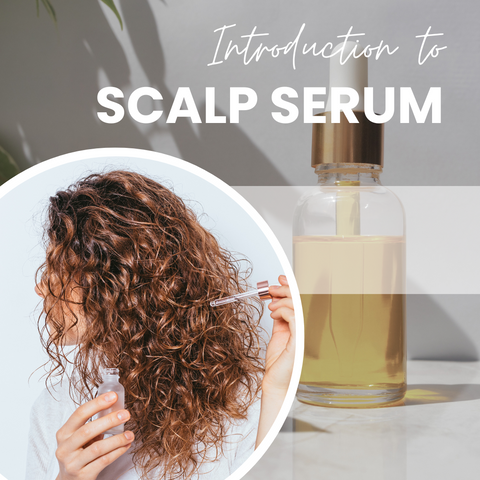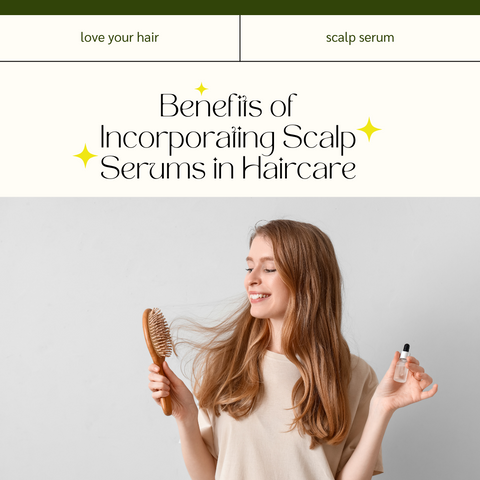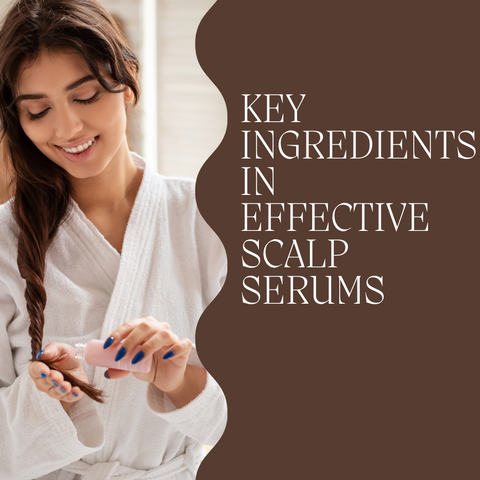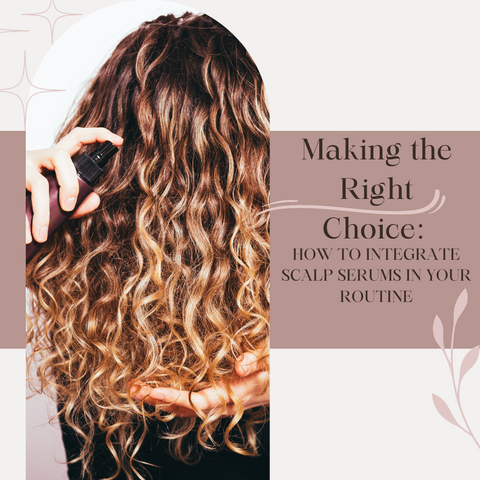Scalp serums have grown in popularity due to their ability to stimulate healthy hair development, manage scalp concerns, and improve the overall quality of your hair. In this detailed guide, we'll decode the magic of scalp serums, covering everything from their advantages to application recommendations.
Introduction to Scalp Serums

Scalp serums are specialised hair care solutions that address numerous scalp and hair issues, such as dandruff and dryness, as well as hair thinning and loss. They contain a concentrated blend of active chemicals, botanical extracts, and vitamins that support scalp health and improve hair condition. In this introduction to scalp serums, we'll look at their benefits and how they can improve your hair care routine.
What are Scalp Serums?
Scalp serums are designed to address specific issues like these and work to repair them from the inside out. Scalp serums provide an excuse to tackle the buildup that occurs over time as a result of excessive product use while also stimulating your scalp with a little massage.
The Rise of Scalp Care Awareness
Scalp care knowledge has grown in recent years as individuals recognise the significance of a healthy scalp for overall hair health. Historically, many people were preoccupied with hair care products and regimens, frequently forgetting the need for scalp care. However, an increasing understanding of the importance of the scalp for hair condition and growth has resulted in a shift in emphasis. Understanding the scalp-hair relationship, hair and scalp concerns, holistic hair care, specialised scalp products, information availability, celebrities and influencers, natural and organic techniques, preventive and maintenance are some of the reasons why scalp care knowledge is growing. It is probable that as more cutting-edge methods and products for scalp care are created, the emphasis on scalp health will continue to grow.
Benefits of Incorporating Scalp Serums in Haircare

Including scalp serums in your hair care routine has a lot of benefits because these specialised treatments are designed to improve scalp health, address specific issues, and improve overall hair quality. Some of the advantages of using scalp serums include improved scalp health, stimulation of hair growth, reduced hair shedding, strengthened hair, balanced scalp, improved hair texture, hydration and nourishment, targeted solutions, preventative care, personalised care, consistency and routine, and positive self-care. For the greatest results, select a serum that addresses your individual hair and scalp needs and follow the product's directions. It's also a good idea to contact a dermatologist or healthcare practitioner for personalised advice, especially if you have specific concerns about the condition of your hair and scalp.
Boosting Hair Growth and Thickness
To increase hair growth and thickness, a healthy lifestyle, regular hair care practises, and, in some situations, the use of specialised hair growth products are required. Diet and nutrition, scalp care, hair care practises, avoiding overwashing, reducing stress, hair growth products, prescription medications, platelet-rich plasma (PRP) therapy, low-level laser therapy (lllt), hair transplant, and lifestyle habits are some tips and strategies to help you achieve thicker and more robust hair. If you are concerned about hair loss or thinning, seek personalised advice and recommendations from a healthcare provider or dermatologist.
Providing Essential Nourishment to Hair Roots
It is important to nourish your hair roots in order to promote healthy hair development and preserve the general quality of your hair. Here are a few strategies to guarantee your hair roots get the nutrients they require:
-
Balanced Diet: Consume a nutritious diet that is well-balanced. Protein, vitamins (particularly A, C, D, and E), minerals (such as iron and zinc), and omega-3 fatty acids are all included. Protein is especially significant because hair is mostly made up of a protein called keratin. To promote healthy hair development, include lean meats, poultry, fish, eggs, dairy products, beans, and nuts in your diet.
-
Stay Hydrated: Proper hydration is vital for keeping your scalp and hair healthy. Drink plenty of water every day to keep your hair and scalp hydrated.
-
Hair Supplements: Consider taking hair supplements after talking with your doctor. Supplements such as biotin, folic acid, and omega-3 fatty acids help offer your hair with the extra nutrition it need.
-
Scalp Massage: Massage your scalp gently to increase blood flow to the hair follicles. Increased blood circulation can aid in the delivery of nutrients to the hair roots.
-
Topical Treatments: Use topical treatments to nourish the scalp and hair roots, such as scalp serums or hair growth products. Look for products that contain hair-strengthening chemicals such as minoxidil, caffeine, or natural extracts.
-
Avoid Harsh Chemicals: Hair care products containing harsh chemicals, sulphates, and alcohol should be avoided because they can damage hair and irritate the scalp. Choose softer, sulfate-free products.
-
Protect Hair from Environmental Damage: Use UV-protecting hair products or wear a hat to protect your hair from the sun and other environmental toxins. Environmental stressors can weaken hair roots.
-
Avoid Overwashing: Washing your hair too regularly can deplete its natural oils, resulting in dryness and hair thinning. Depending on your hair type and lifestyle, wash your hair as needed.
-
Regular Trimming: Trim your hair on a regular basis to remove split ends and avoid damage. This can help to preserve your hair's general health and strength.
-
Stress Management: Stress can have a bad impact on hair health and lead to hair loss. Stress-reduction practises such as meditation, yoga, or deep breathing exercises should be used.
-
Adequate Rest: Make sure you get enough sleep because it is necessary for the body's overall repair and growth processes, including those related to hair.
-
Personalised Care: Take into account your hair type and personal requirements. What works for one individual might not work for another. Consider seeking personalised advice from a dermatologist or hair care specialist.
Keep in mind that hair growth and condition vary from person to person, and that results may take time. You can support the health and strength of your hair from the roots to the tips by providing essential nourishment to your hair roots via proper nutrition, gentle care, and targeted treatments.
Preventing Hair Breakage and Thinning
Preventing hair breakage and thinning requires a combination of healthy hair care practises and lifestyle adjustments. Gentle handling, avoiding tight hairstyles, limiting heat styling, protective styling, trimming regularly, avoiding overprocessing, choosing gentle hair care products, reducing overwashing, nutrition and hydration, hair supplements, protecting hair from environmental damage, avoiding tight towel turbans, using silk or satin pillowcases, stress management, and balanced hormones are some tips to help protect your hair from damage and maintain its thickness. By including these suggestions in your regular regimen, you may help prevent damage to your hair while also maintaining its thickness and strength.
Enhanced Scalp Health and Moisturization
Improving scalp health and maintaining sufficient moisture levels are important aspects of supporting healthy hair development and general hair well-being. Here are some ideas and practises for keeping your scalp hydrated and healthy:
-
Gentle Cleansing: Use a gentle, sulfate-free shampoo and conditioner that is appropriate for your hair type. Avoid overwashing, since this can deplete the scalp of its natural oils.
-
Proper Hydration: Stay hydrated by drinking plenty of water on a daily basis. Proper hydration helps your scalp's moisture equilibrium.
-
Balanced Diet: Eat a diet high in critical nutrients such as vitamins (A, C, D, and E), minerals (iron, zinc), and omega-3 fatty acids. These nutrients help to maintain the health of the scalp.
-
Scalp Massage: Massage your scalp in a circular motion with your fingertips on a regular basis. Scalp massage can improve hair development by increasing blood flow to the hair follicles.
-
Moisturizing Scalp Treatments: To moisturise your scalp, use natural oils like as coconut oil, jojoba oil, or argan oil. Apply a small amount, massage it in, and let it sit for several hours or overnight before washing.
-
Conditioning: After shampooing, use a moisturising conditioner to moisturise the scalp and hair. Pay extra attention to your hair's mid-lengths and ends.
-
Humidifier: Consider utilising a humidifier to add moisture to the surroundings if you live in a dry region or use heating or cooling systems that dry the air. This can aid in the prevention of scalp dryness.
-
Avoid Harsh Hair Products: Reduce the usage of hair care products containing harsh chemicals, sulphates, and alcohol, which can cause scalp dryness and irritation.
-
Protect from the Sun: When exposed to the sun for extended periods of time, wear a hat or use UV-protected hair treatments to prevent scalp sunburn and dryness.
-
Aloe Vera Gel: Apply aloe vera gel to your scalp to relieve inflammation and give hydration. Aloe vera has inherent moisturising and healing capabilities.
-
Cooler Water Temperature: Use lukewarm or chilly water to wash your hair instead of hot water, as hot water can dry out the scalp and hair.
-
Regular Trims: Regular hair cuts are recommended to remove split ends and keep them from travelling up the hair shaft. Hair growth can also be stimulated by trimming.
-
Protect from Chlorine and Saltwater: Wet your hair and apply a protective product before swimming in pools or the ocean to prevent chlorine or saltwater from drying out your scalp and hair.
-
Consult a Dermatologist: Consult a dermatologist if you have chronic scalp dryness, flakiness, or irritation for a proper diagnosis and personalised treatment suggestions.
Key Ingredients in Effective Scalp Serums

Effective scalp serums frequently contain a blend of important substances chosen for their potential to enhance scalp health and hair development. These components have been carefully chosen to address specific scalp and hair issues. Some of the major elements typically found in successful scalp serums are as follows:
-
Minoxidil: Minoxidil is an FDA-approved active component that has been shown to promote hair growth. It works by boosting blood flow to the hair follicles and lengthening the hair development period.
-
Caffeine: Caffeine is thought to stimulate hair growth by increasing blood circulation to the scalp. It can also help combat the effects of DHT, a hormone connected with hair loss.
-
Peptides: Peptides are minuscule proteins that have the ability to fortify hair follicles and encourage the growth of stronger, thicker hair. They might also aid in the loss and density of hair.
-
Natural Extracts: Some of the natural extracts found in scalp serums include ginseng, saw palmetto, and pumpkin seed oil. These ingredients have traditionally been used to promote hair growth and overall scalp health.
-
Biotin: Biotin, a B-vitamin, is required for healthy hair growth. It is a common ingredient in scalp serums because it can help strengthen hair and reduce breakage.
-
Keratin: The structural protein that comprises the hair shaft is keratin. Keratin-containing scalp serums can help to strengthen and repair damaged hair.
-
Amino Acids: Amino acids are essential for hair health because they are the building blocks of protein. They have the potential to make hair stronger and healthier.
-
Botanical Oils: Oils with moisturising and nourishing characteristics, including argan oil, jojoba oil, and coconut oil, are frequently utilised in scalp serums. They can assist with dryness and flakiness.
-
Niacin (Vitamin B3): Niacin has the potential to increase hair growth by improving blood circulation to the scalp.
-
Vitamins and antioxidants: Vitamins like vitamin E and antioxidants like green tea extract are included because of their ability to protect the scalp from damage and maintain overall scalp health.
-
Hyaluronic Acid: Hyaluronic acid is well-known for its hydrating properties. It aids in the retention of moisture on the scalp, reducing dryness and flakiness.
-
Salicylic Acid: Salicylic acid is used to exfoliate and remove dead skin cells from the scalp. It may be beneficial for people who have dandruff or scalp conditions that cause flakiness.
-
Collagen: Collagen is a protein that can improve hair structure, making it appear thicker and more resilient.
The specific ingredient mix of a scalp serum may differ based on the product's intended use and target concerns. Consider your unique demands and hair type while choosing a scalp serum. If you have specific concerns about hair thinning or scalp health, it's also a good idea to contact with a dermatologist or healthcare practitioner, since they may provide personalised advice and help.
Natural Extracts for Scalp Soothing
Because of their relaxing and calming characteristics, natural extracts are frequently utilised in scalp care products such as scalp serums. They can aid in the relief of scalp irritation, itching, and inflammation. Here are some natural extracts that are typically found in scalp serums for scalp soothing:
-
Aloe Vera: Aloe vera is well-known for its anti-inflammatory and moisturising properties. It can help to relieve scalp irritation and itchiness. Aloe vera gel can be used directly on the scalp.
-
Chamomile: Chamomile extract has anti-inflammatory and calming properties. It can aid in the relief of scalp redness and discomfort. Chamomile tea can also be used to rinse your hair naturally.
-
Lavender: Due to its calming and sedative properties, lavender oil is frequently used. It may also have antibacterial qualities and help soothe an irritated scalp.
-
Calendula: The anti-inflammatory qualities of calendula extract are well-known. It can be applied to lessen discomfort and redness in the scalp.
-
Tea Tree: Antifungal and antibacterial qualities can be found in tea tree oil. It is frequently used to treat seborrheic dermatitis and dandruff on the scalp.
-
Peppermint: Peppermint oil soothes and cools the scalp, relieving irritation and itching. It may also enhance the scalp's blood flow.
-
Witch Hazel: This astringent herb also has anti-inflammatory qualities. It can lessen redness and soothe an irritated scalp.
-
Green Tea: Rich in antioxidants, green tea extract helps shield the scalp from harmful environmental factors. Its anti-inflammatory qualities are also present.
-
Cucumber: Cucumber extract hydrates the skin and soothes dry, irritated scalps. It can be calming and has a cooling effect.
-
Neem: Neem oil or neem leaf extract has antibacterial and antifungal properties, making it useful for treating scalp conditions and soothing inflammation.
-
Cedarwood: Cedarwood oil is known for its calming and soothing properties. It can help relieve itchy or irritated skin on the scalp.
-
Rosemary: Rosemary oil can help relieve irritation by increasing circulation to the scalp and having anti-inflammatory qualities.
-
Oat Extract: Oat extract has anti-inflammatory and itching properties. It is frequently found in products meant for scalps that are sensitive or irritated.
When using scalp serums or other hair care products containing natural extracts, a patch test is required to guarantee that you do not have any allergies or sensitivities to these substances. Additionally, if you have recurrent scalp difficulties or worries about your scalp health, it's a good idea to follow the product directions and check with a dermatologist or healthcare expert. They can make tailored recommendations to meet your individual requirements.
Active Agents for Hair Strengthening
Active agents and substances known for their potential to thicken the hair shaft, minimise breakage, and enhance overall hair strength are frequently found in hair-strengthening products. Keratin, biotin, amino acids, panthenol (pro-vitamin B5), niacin (vitamin B3), hyaluronic acid, caffeine, plant extracts, oils, niacinamide (vitamin B3), and silicones are some popular active ingredients in hair strengthening treatments.
Role of Antioxidants in Scalp Protection
Antioxidants are essential for scalp protection since they help to neutralise damaging free radicals and reduce oxidative stress. Free radicals are extremely reactive chemicals that can harm cells in the scalp and hair follicles. This damage can result in a variety of scalp and hair disorders. Antioxidants fight free radicals and have various benefits for scalp health and protection:
-
Reducing Oxidative Stress: Oxidative stress is brought on by an imbalance in the body's levels of antioxidants and free radicals. This stress can cause cell damage, including those on the scalp, which can result in hair loss, inflammation, and scalp conditions.
-
Preventing Inflammation: Oxidative stress can cause inflammation in the scalp, resulting in dandruff, itching, and scalp redness. Antioxidants can reduce inflammation and soothe the scalp.
-
Strengthening Hair Follicles: By shielding them from oxidative damage, antioxidants can promote the well-being of hair follicles. Strong hair growth depends on healthy hair follicles.
-
Encouraging Hair Growth: Antioxidants shield the healthy scalp environment, which is favourable to hair growth. Antioxidants can improve the delivery of nutrients to the hair follicles by increasing blood circulation to the scalp.
-
Slowing Hair Aging: Oxidative stress can hasten hair ageing, causing premature greying and thinning. Antioxidants may aid in the slowing of the ageing process and the preservation of hair colour.
-
UV Protection: UV radiation from the sun can cause damage to the scalp and hair. Sunburn and dryness of the scalp are avoided by antioxidants with UV protection capabilities.
Using antioxidant-rich hair care products, such as shampoos, conditioners, and scalp serums, can help maintain a healthy scalp and support optimal hair development. In addition to using such products, eating a well-balanced diet rich in antioxidants and staying hydrated will help with general scalp protection and hair health.
Making the Right Choice: How to Integrate Scalp Serums in Your Routine

Including scalp serums in your hair care routine is an excellent method to address specific scalp and hair issues. Here's how to identify your concerns, consult a dermatologist, choose the right serum, follow the instructions, test for allergies, shampoo and condition, application, massage, do not rinse, consistency is key, maintain a healthy lifestyle, protect your scalp, and stay informed. If you have any questions about using scalp serums or if you have any negative reactions, speak with a dermatologist or healthcare practitioner for personalised advice and recommendations.
















